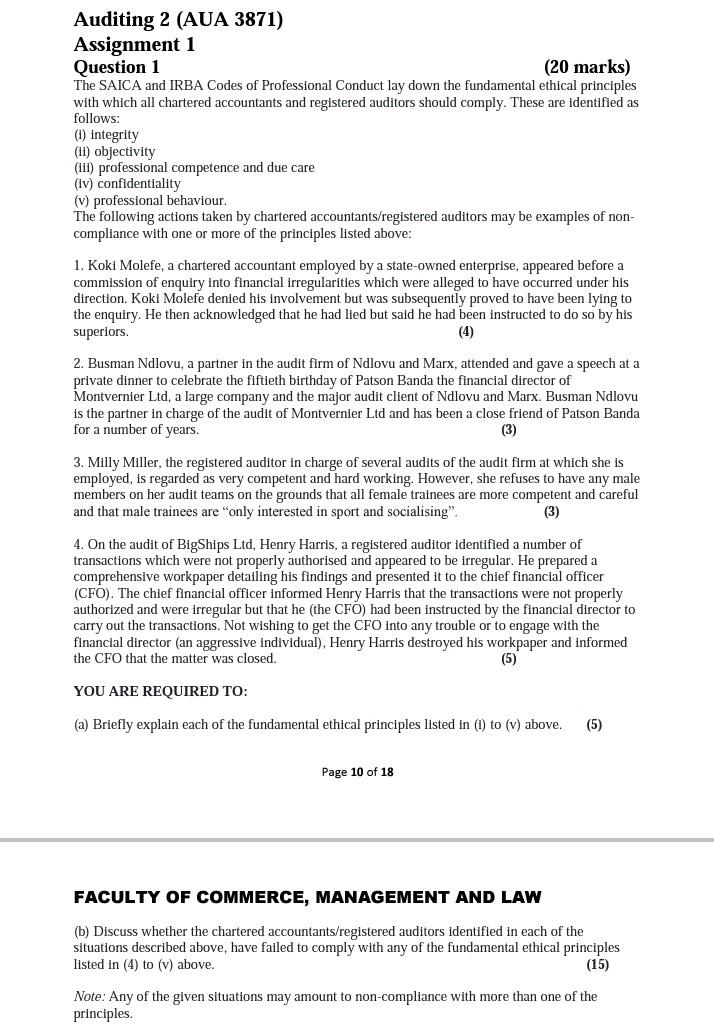Answered step by step
Verified Expert Solution
Question
1 Approved Answer
Auditing 2 (AUA 3871) Assignment 1 Question 1 (20 marks) The SAICA and IRBA Codes of Professional Conduct lay down the fundamental ethical principles with

Auditing 2 (AUA 3871) Assignment 1 Question 1 (20 marks) The SAICA and IRBA Codes of Professional Conduct lay down the fundamental ethical principles with which all chartered accountants and registered auditors should comply. These are identified as follows: (1) Integrity (11) objectivity (111) professional competence and due care (lv) confidentiality (v) professional behaviour. The following actions taken by chartered accountants/registered auditors may be examples of non- compliance with one or more of the principles listed above: 1. Koki Molefe, a chartered accountant employed by a state-owned enterprise, appeared before a commission of enquiry into financial irregularities which were alleged to have occurred under his direction. Koki Molefe denied his involvement but was subsequently proved to have been lying to the enquiry. He then acknowledged that he had lied but said he had been instructed to do so by his superiors. (4) 2. Busman Ndlovu, a partner in the audit firm of Ndlovu and Marx, attended and gave a speech at a private dinner to celebrate the fiftieth birthday of Patson Banda the financial director of Montvernier Ltd, a large company and the major audit client of Ndlovu and Marx. Busman Ndlovu is the partner in charge of the audit of Montvernier Ltd and has been a close friend of Patson Banda for a number of years. (3) 3. Milly Miller, the registered auditor in charge of several audits of the audit firm at which she employed, is regarded as very competent and hard working. However, she refuses to have any male members on her audit teams on the grounds that all female trainees are more competent and careful and that male trainees are "only interested in sport and socialising" (3) 4. On the audit of BigShips Ltd, Henry Harris, a registered auditor identified a number of transactions which were not properly authorised and appeared to be irregular. He prepared a comprehensive workpaper detailing his findings and presented it to the chief financial officer (CFO). The chief financial officer informed Henry Harris that the transactions were not properly authorized and were irregular but that he (the CFO) had been instructed by the financial director to carry out the transactions. Not wishing to get the CFO into any trouble or to engage with the financial director (an aggressive individual), Henry Harris destroyed his workpaper and informed the CFO that the matter was closed. (5) YOU ARE REQUIRED TO: (a) Briefly explain each of the fundamental ethical principles listed in (1) to (v) above. (5) Page 10 of 18 FACULTY OF COMMERCE, MANAGEMENT AND LAW (b) Discuss whether the chartered accountants/registered auditors identified in each of the situations described above, have failed to comply with any of the fundamental ethical principles listed in (4) to (v) above. (15) Note: Any of the given situations may amount to non-compliance with more than one of the principles
Step by Step Solution
There are 3 Steps involved in it
Step: 1

Get Instant Access to Expert-Tailored Solutions
See step-by-step solutions with expert insights and AI powered tools for academic success
Step: 2

Step: 3

Ace Your Homework with AI
Get the answers you need in no time with our AI-driven, step-by-step assistance
Get Started


